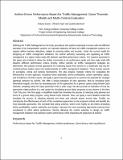Airline-Driven Performance-Based Air Traffic Management: Game Theoretic Models and Multicriteria Evaluation
Author(s)
Evans, Antony; Vaze, Vikrant; Barnhart, Cynthia
DownloadBarnhart_Airline-driven performance-based air traffic management.pdf (1.531Mb)
OPEN_ACCESS_POLICY
Open Access Policy
Creative Commons Attribution-Noncommercial-Share Alike
Terms of use
Metadata
Show full item recordAbstract
Defining air traffic management as the tools, procedures, and systems employed to ensure safe and efficient operation of air transportation systems, an important objective of future air traffic management systems is to support airline business objectives, subject to ensuring safety and security. Under the current model for designing air traffic management initiatives, the central authority overseeing and regulating air traffic management in a region makes trade-offs between specified performance criteria. The research presented in this paper aims instead to allow the airline community to set performance goals and thus make trade-offs between different performance criteria directly, before specific air traffic management strategies are determined. We propose several approaches for collecting inputs from airlines in a systematic way and for combining these airline inputs into implementable air traffic management initiatives. These include variants of averaging, voting, and ranking mechanisms. We also propose multiple criteria for evaluating the effectiveness of each approach, including Pareto optimality, airline profitability, system optimality, equity, and truthfulness of airline inputs. We apply a game-theoretic approach to examine the potential for strategic (gaming) behavior by airlines. We offer a broad evaluation of each approach, first by providing some theoretical insights, and then by simulating each of the approaches for a generic system using Monte Carlo methods, sampling values for input parameters from a wide range. We also provide an indication of how the approaches might perform in a real system by simulating ground delay programs at two airports in the New York City area. We first apply a simplified model that simulates the process of selecting only planned end times of a ground delay program, using Monte Carlo methods. Next, we apply a more detailed model that simulates the process of selecting planned end times and reduced airport arrival rates. Finally, we characterize the effectiveness of each of the considered approaches on the proposed criteria and identify the most desirable approaches. We conclude that voting schemes, which score highly on all criteria (including airline profitability, system optimality, and equity), represent the most promising approaches (among those considered) to elicit airline preferences, thereby allowing the central authority to design air traffic management initiatives that optimize system performance while respecting the objectives of airlines.
Date issued
2014-11Department
Massachusetts Institute of Technology. Department of Civil and Environmental EngineeringJournal
Transportation Science
Publisher
Institute for Operations Research and the Management Sciences (INFORMS)
Citation
Evans, Antony et al. “Airline-Driven Performance-Based Air Traffic Management: Game Theoretic Models and Multicriteria Evaluation.” Transportation Science 50,1 (February 2016): 180–203 © 2016 INFORMS
Version: Author's final manuscript
ISSN
0041-1655
1526-5447